Last year was hectic for so many people, and whether that's meant good or bad things into the new year, all the many events boil down to stress for your body. Just going places and thinking about the events of a day, even if it's not particularly hectic, puts stress on your body; that's what sleep is meant to help us recover from.
But some of us don't deal very well with stress, and our bodies tell us that in a variety of ways, from food intolerances and heart palpitations to depression and anxiety symptoms. Sometimes just getting a good night's rest isn't enough, or the stress has gotten to the level that it's interrupting our sleep and causing insomnia.
This is where I am now, and have been on-and-off for years. So with the help of my therapist, acupuncturist, and the dozens of specialists I've seen over the last half decade, this is my list of ways to calm down. Like in my self-care article, this is broken down into three sections before or during a histamine flare or bout of particularly high stress.
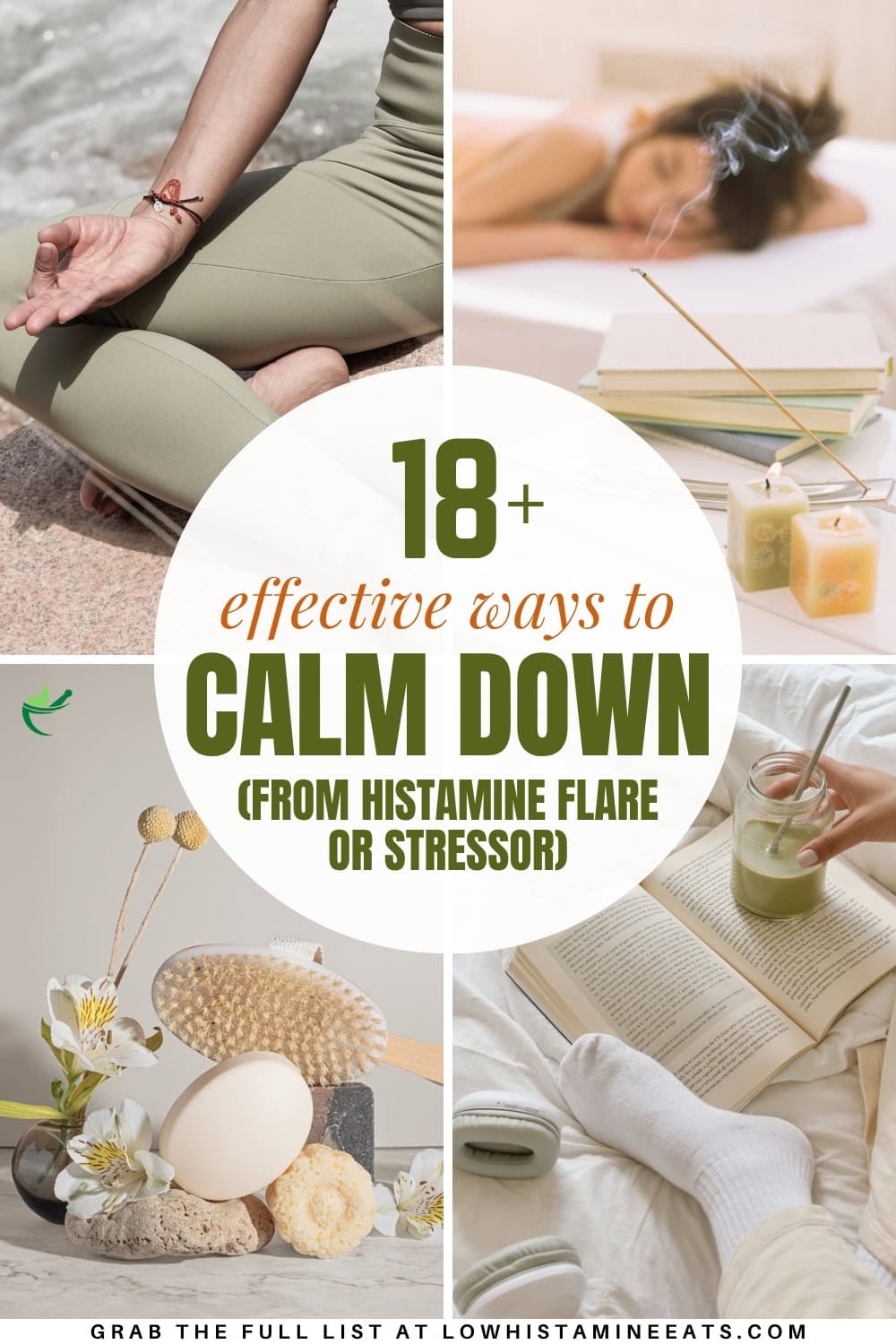
Jump to:
🔗 Connection Between Stress, Histamine & Inflammation
Stress is related to both histamine production and systemic inflammation, each of which is then also related to each other.
Stress is related to histamine issues because of how it affects the immune system— stress on the body causes the immune system to react to it like a threat, downgrading its overall response but keeping itself always on alert. This remains true whether it's emotional stress, physical exhaustion, pain, or even environmental pollution.
A constant low-level activation of the immune system is expressed as systemic inflammation, meaning a heightened level of inflammatory substances in the body. One such substance is histamine, along with cytokines, bradykinin, and prostaglandins.
One key to keeping histamine levels in check is to keep your stress levels in check. Remember you only have control over 3 things: your Attitude, your Breathing, and your Choices.
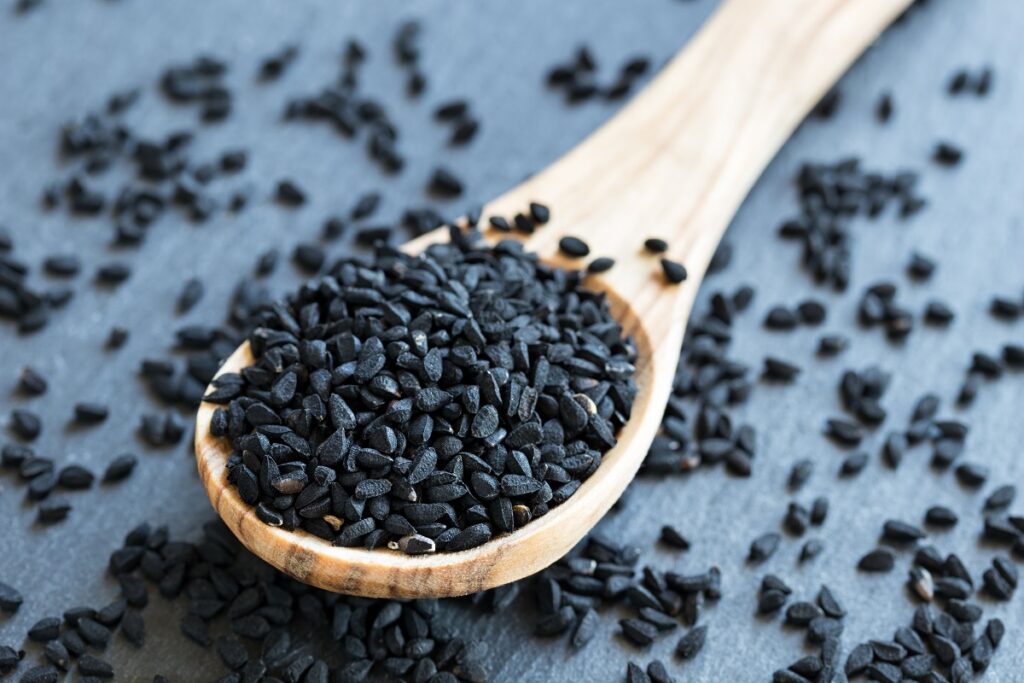
🧘♀️ Preventing Stress & Histamine Flares (Inflammation)
Morning/Evening Meditation
Whether you take two minutes upon waking or five minutes before dinner, meditating has been scientifically proven to calm your vagus nerves, which innervate your enteric nervous system (the one in your gut).
Just give yourself a month of three minutes a day, and all other thing equal, you'll find yourself a bit more calm at the end. You may even want to continue, and eventually increase your meditation time. I recommend checking out an app like Calm or Headspace (both have free trials, as well as free versions).
Sound Baths
If you've never experienced one, a sound bath is exactly what it sounds like— relaxation & rejuvenation for your ears. While I like to listen to one for a 5-10 minutes in the morning, I have many friends who look forward to an auditory afternoon pick-me-up.
The baths can range in sound from echoes of gongs and wine glass tones to low-resonance singing and chanting. My favorite Youtube channels for sound baths often have a few different sections, though you can also attend sound baths in person.
Going for a Walk
Even just a 5-10 minute walk at my own pace gets my heart beat up in a healthy way (be cautious with this if you have POTS). I often try to go for this walk after a meal, as a way of helping my digestive system along.
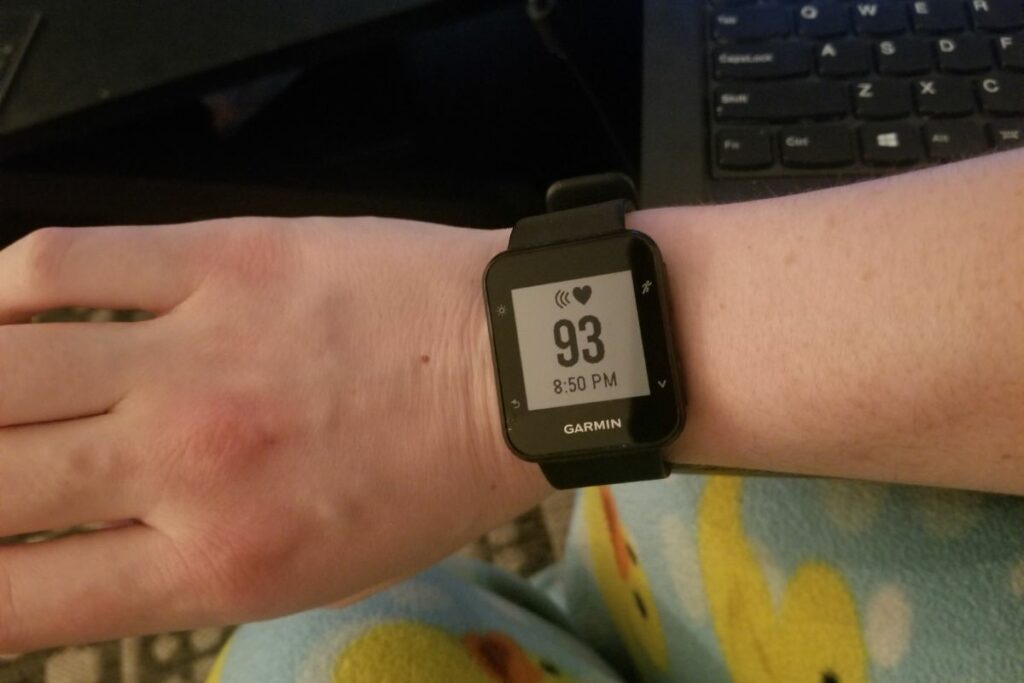
QiGong Activation
This particular one-minute routine is a great technique to use in the mornings to make up your nervous system and get everything firing on all cylinders. We do this at the beginning of my weekly tai chi class, and I like it so much that sometimes I'll do it when I've found myself sitting for way too long.
Vagus Nerve Stimulation
As touched on above, the vagus nerves innervate most of your body (vagus = wandering in Latin), including the enteric nervous system (that of the gut). Since you have more mast cells in your gut than anywhere else, preventing your enteric nervous system from over-reacting is a crutial step in healing.
This podcast does a great job at explaining the importance of the vagus nerves, and includes a vagus nerve-calming breathing technique at the end. Alternatively, this video covers the same basic material in shorter form, then includes 3 calming techniques at 8:53 (Bhramari Practice), 11:01 (Pranayana Triangle Breathing), and 12:10 (Ear Massage).
Other types of deep breathing also help to cultivate that deep calm feeling. These include Meditation Breathing, 5-7-8 Breathing, and, Alternate Nostril Breathing. If any of these vagal exercises seem to resonate or produce positive effects for you, I highly suggest watching the video Polyvagal Theory Explained Simply by Sukie Baxter.

Meditation Music
I personally prefer to listen to Rumi while working, but I've found that certain frequencies and intonations keep me more at ease and calm while I work. Since I mostly work online on my computer, having relaxing music to listen to in the background has been a saving grace.
Regular Bath
I bathe at least four times a week in the tub, once a week adding epsom salt and lighting a candle for some scented ambiance. The epsom salt is thought to help balance out low magnesium levels, and to do this you only need to add a little over a cup of it directly to the water. Make sure to shower off a bit after your bath, to rinse off any excess toxins you sweat out into the bath water.
Pamper Yourself
Indulge in those things that you can. If you're food-driven like me and can't eat a lot of your favorites, this can feel impossible. I've shifted over the years to trying to focus on how doing certain things or even thinking about happy memories makes my body feel.
It's like a warm glow, and while I'm aware that those are just neurotransmitters calming my sense of pain, I can still enjoy the nice feeling after a long day.
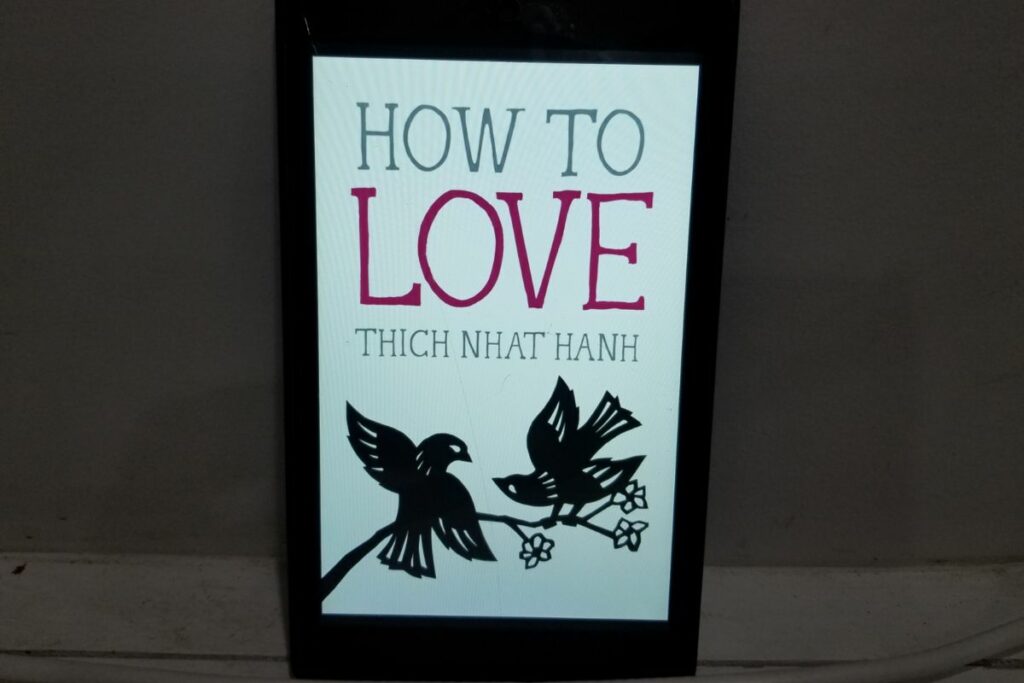
🫨 Preventing Stress & Managing Stress Levels
Feel-Good TV
Try watching feel-good shows that remind you there's love and good people in this world, just trying to make other people's lives better. Some of my favorites on Netflix are Queer Eye, Love on the Spectrum, Instant Dream Home, and all sorts of other Home Improvement shows.
EFT Tapping
Known as the 'Emotional Freedom Technique,' this type of tapping exercise is focused on processing and working through trauma by talking through it while tapping on specific acupoints. This is often used as a method of emotional regulation, thought to help restore balance & unblock energy .
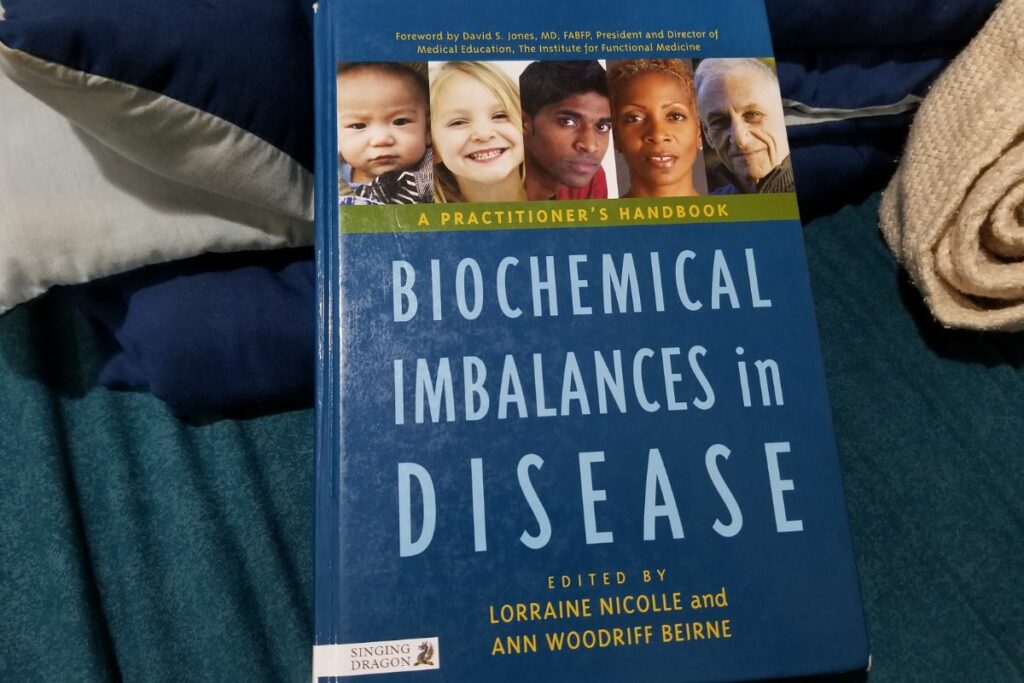
Acupressure
Using either (or both) an acupressure mat or basic acupressure hand massage, you can regularly calm your nervous system, more easily relax, and even sleep better. Getting better sleep is tantamount to calming & keeping your system calm, so that's certainly a goal worth pursuing.
Driving Videos
This may seem random, but watching 4K videos of people driving up and down beautiful places in the world can be very soothing. I have a personal affiliation for ones along the Amalfi Coast.
Bob Ross Videos
Somewhat related to the feel-good content mentioned above, painting videos from Bob Ross's program in the eighties and nineties can be incredibly soothing. It's all about finding content which doesn't negatively emotionally trigger you to feel stressed, anxious, or depressed. If these videos also help you feel normal when you're in a dark place, well, you're not the only one.
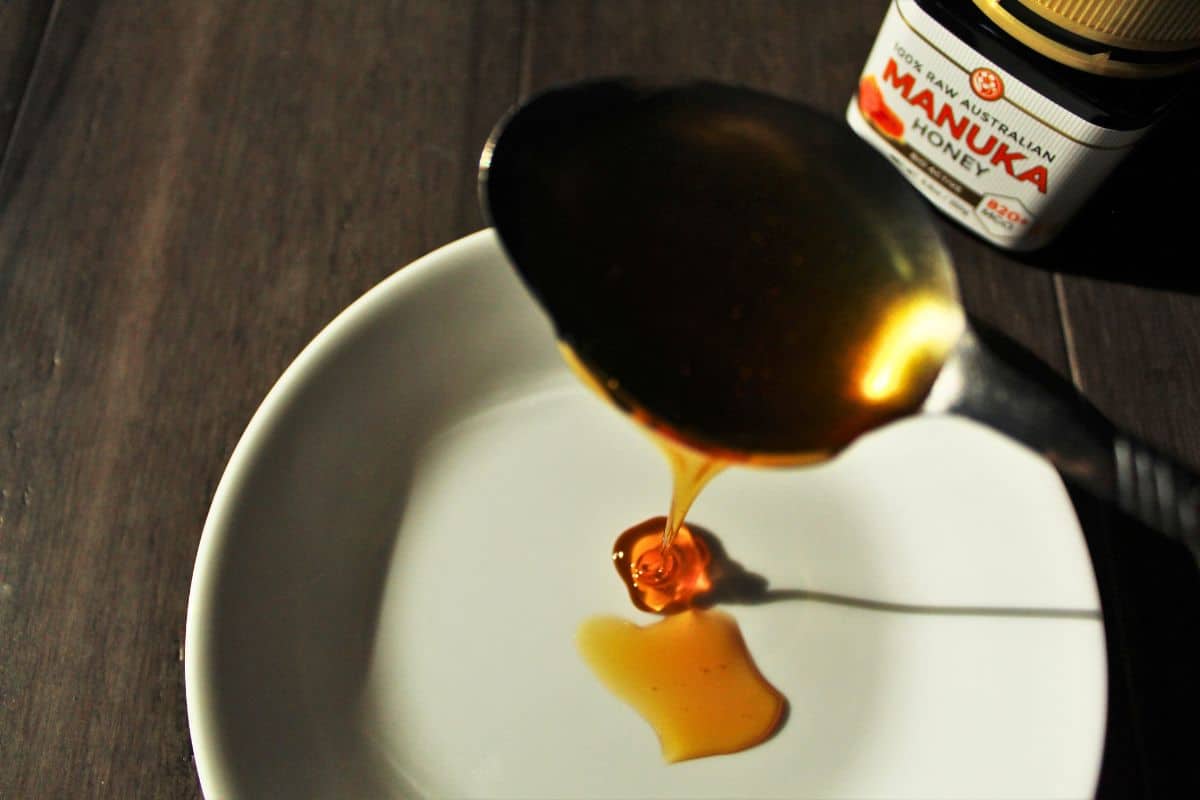
💪 Dealing With Stress In-The-Moment
Grounding Techniques
These are like rapid-response techniques to deal with acute feelings of distress, whether due to physical or mental symptoms. They basically distract your mind from starting or continuing down the spiral of stress.
Some examples of such techniques are the ABCs (picking a category of food or people and trying to come up with one that starts with each letter) or 12345s (coming up with 1, 2, 3, 4, or 5 items in increasing order that you can taste, feel, smell, hear, and see, in any order).
Stomach Massage
This technique for gastroparesis or IBS symptoms always seems to cut through the noise of my stomach's nervous system over-reacting. Sometimes it helps to move around gas, but most of the time it just stimulates parts of my stomach that almost seemed like they had frozen in response ot the overstimulation. Another one I like is this one.
Deep Breathing
For a quick fix, take 10 deep breaths with six seconds breathing in and seven seconds breathing out.
Sensory Stimulation
Whether scent, visuals, or touch is your preference, there's likely something nearby you can try this with. Consider a distraction with a warm cup of tea in a quiet room, light feathers, or even light hand touches across your skin as something to focus on. After awhile, if you focus well enough it can have a meditative effect.
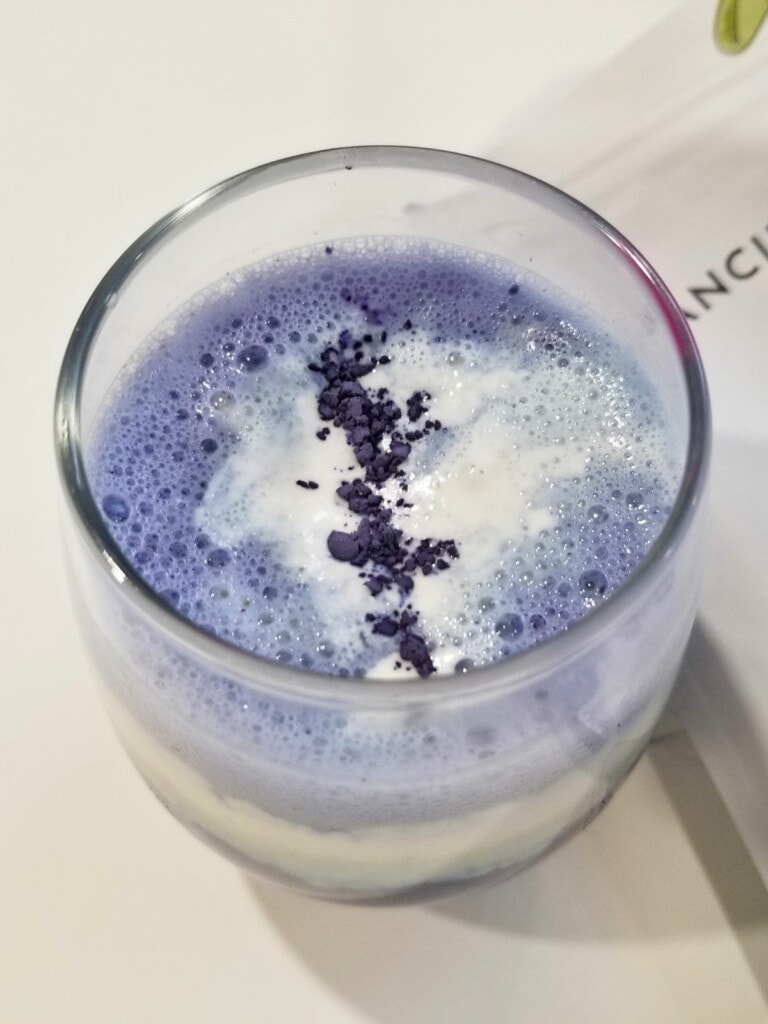
Ice Muscles
Applying cold to sore or pained muscles fights inflammation, whether caused by exercise, massage, or seemingly nothing at all. It also does a great job of distracting the mind from any pain, even if not accompanied by soreness or muscle fatigue. I regularly check in with myself when I'm feeling tired or cranky to see if any of it is caused by low-level muscle pain (even in my stomach).
Pull Back
Mentally remove yourself from the stress spiral and try to be cognizant while you're experiencing this stress, so that next time you can recognize even sooner when you're approaching the edge of that cliff that makes you feel so terrified and out-of-control— this will help you recognize when you're being overtaxed and start to self-correct.
This is your life, and even when sometimes it doesn't feel like it, you are in control of what you do with it.

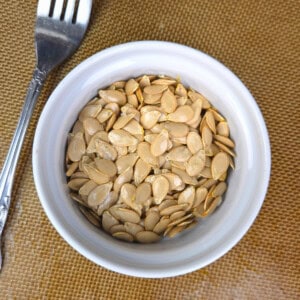






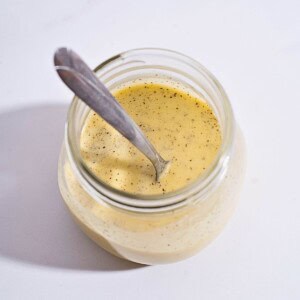
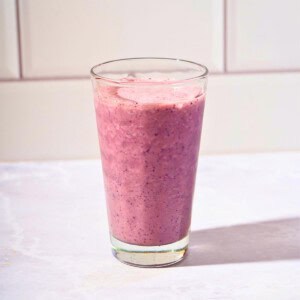

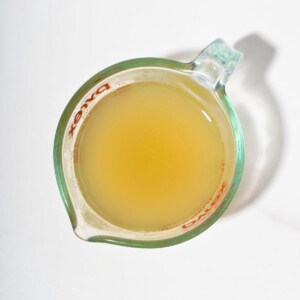



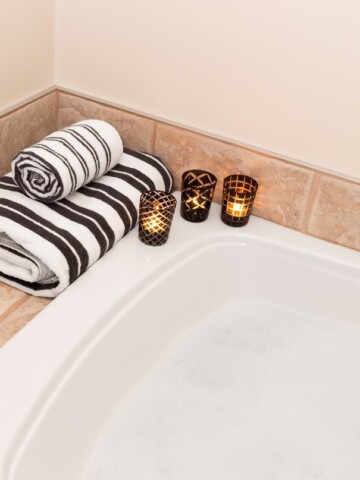
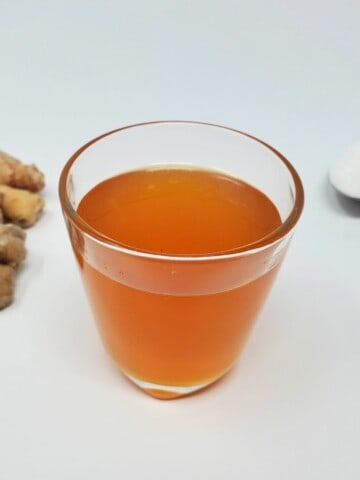
Ernestine Leon-Perez says
Very helpful information. I go through this almost every year. I have to go back and remind myself what it is that I need to avoid before it I get a full-blown attack
Max says
I'm sorry this is such a recurrence for you, but I'm glad you've found the information helpful - hopefully you'll get a handle on it even more quickly this year!
R.A. says
Dear Max,
I only stumbled across your website this evening, but I'm so grateful for your website and all of your fabulous work. I haven't truly seen my health through the histamine lens before, but your resources are so rich and thought provoking. Looking forward to reading more about this!
Good luck with your health onwards!
All the best,
R.A.
Max says
Thank you, R.A.! I hope it's helped give you a direction to pursue in terms of bettering your health. 🙂
Gina says
Great information thanks you have lots to guide people
Max says
My pleasure, Gina! I'm just glad if it helps anyone else through a tough time. <3
Mould? says
Hi Max,
Thanks for this helpful info, have tried some of your recipes too!
After reading your post about your health journey, I wanted to ask, have you been tested for CIRS/mould toxicity? According to Beth O'Hara, who you reference elsewhere, it is a number 1 cause of MCAS and that people can't truly heal until they heal from it. It is linked to mood issues too due to neuroinflammation etc. A great resource on it and other related issues is Dr Neil Nathan's book 'Toxic.'
Here's to healing!
Max says
Thank you for your comment! Yes, I've been tested for mold and have done a couple months of detox after mild to moderate levels of a couple different more common mycotoxins were found, but didn't notice much change. I think mold may have helped set off some of my issues, but I don't think it stuck around, if that made sense. Honestly, one of the top three or four biggest things I did that helped was cutting out grains, refined oils and most sugar, which are three quite inflammatory food groups I don't think get enough flak for how damaging they are. I had moderate to severe depression and mild to moderate anxiety for several years that's been pretty much gone for several months now after cutting out those three groups (by about 90%, but not completely). It's made handling the histamine ups and downs MUCH more manageable; I'll tell you that much!
Mould? says
Hi Max,
Really interesting, glad you are feeling better. I think another important part of complex illness is trauma. Have you read 'The Body Keeps Score?' I hope you continue to feel well!
Max says
Thank you, and I have! It was quite graphic at times, honestly, but has some good information. Why Zebras Don't Get Ulcers is another good one for understanding the role stress plays in illness, which seems to be a lot more of what's set me off. After being so sick, at least you always have those lows to look back at (and hopefully just back) to remember why you can't live like 'normal people' do and need to consistently give yourself time for rest.
I hope you're feeling well, yourself!
Elaine says
Brilliantly helpful post. Thanks so much for putting it together
Max says
That's so sweet! You're very welcome, Elaine. I'm glad it helps.